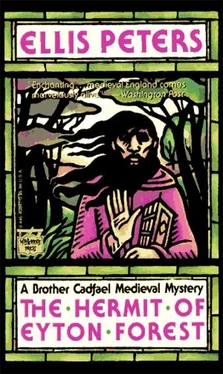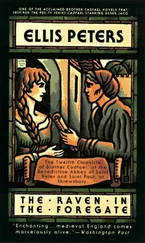And run he did, fast and straight for the Eaton fields, and hailed the first Eaton men he sighted. They came in haste, with a hurdle borrowed from the sheep fold, and between them with care and with some suppressed and understandable cursing from the victim, lifted Eilmund on to it, and bore him the half-mile to his forest cottage. Mindful that the man had a daughter at home, Hyacinth took it upon himself to run on before to give her warning and reassurance, and time to prepare the injured man’s couch.
The cottage lay in a cleared assart in the forest, with a neat garden about it, and when Hyacinth reached it the door was standing open, and within the house a girl was singing softly to herself as she worked. Strangely, having run his fastest to get to her, Hyacinth seemed almost reluctant to knock at the door, or enter without knocking, and while he was hesitating on the doorstone her singing ceased, and she came out to see whose fleet footsteps had stirred the small stones of the pathway.
She was small but sturdy, and very trimly made, with a straight blue gaze, the fresh colouring of a wild rose, and smoothly-braided hair of a light brown sheen like the grain of polished oak, and she looked him over with a candid curiosity and friendliness that for once silenced his ready silver tongue. It was she who had to speak first, for all the urgency of his errand. “You’re looking for my father? He’s away to the coppice, you’ll find him where the bank slid.” And the blue eyes quickened with interest and approval, liking what they saw. “You’re the boy who came with the old dame’s hermit, aren’t you? I saw you working in his garden.”
Hyacinth owned to it, and recalled with a lurch of the heart what he had to tell. “I am, mistress, and my name’s Hyacinth. Your father’s on his way back to you now, sorry I am to say it, after a mishap that will keep him to the house for a while, I fear. I came to let you know before they bring him. Oh, never fret, he’s live and sound, he’ll be his own man again, give him time. But his leg’s broken. There was another slip, it brought down a tree on him in the ditch. He’ll mend, though, no question.”
The quick alarm and blanching of her face had brought no outcry. She took in what he said, shook herself abruptly, and went to work at once setting wide the inner and the outer doors to open the way for the hurdle and its burden, and making ready the couch on which to lay him, and from that to setting on a pot of water at the fire. And as she went she talked to Hyacinth over her shoulder, very practically and calmly.
“Not the first time he’s come by injuries, but never a broken leg before. A tree came down, you say? That old willow. I knew it leaned, but I never thought it could fall. It was you found him? And fetched help for him?” The blue eyes looked round and smiled on him.
“Some of the Eaton men were close, clearing a drainage ditch. They’re carrying him in.” They were approaching the door by then, coming as fast as they could. She went out to meet them, with Hyacinth at her elbow. It seemed that he had something more, something different to say to her, and for the moment had lost his opportunity, for he hovered silently but purposefully on the edge of the scurry of activity, as Eilmund was carried into the house and laid on the couch, and stripped of his wet boots and hose, very carefully but to a muffled accompaniment of groans and curses. His left leg was misshapen below the knee, but not so grossly that the bone had torn through the flesh. “Above an hour lying there in the brook,” he got out, between gritting his teeth on the pain as they handled him, “and if it hadn’t been for this young fellow I should have been there yet, for I couldn’t shift the weight, and there was no one within call. God’s truth, there’s more muscle in the lad than you’d believe. You should have seen him heft that tree off me.” Very strangely, Hyacinth’s spare, smooth cheeks flushed red beneath their dark gold sheen. It was a face certainly not given to blushing, but it had not lost the ability. He said with some constraint: “Is there anything more I could be doing for you? I would, gladly! You’ll be needing a skilled hand to set that bone. I’m no use there, but make use of me if you need an errand run. That’s my calling, that I can do.”
The girl turned for an instant from the bed, her blue eyes wide and shining on his face. “Why, so you can, if you’ll be so good and add to our debt. Will you send to the abbey, and ask for Brother Cadfael to come?”
“I will well!” said Hyacinth, as heartily as if she had made him a most acceptable gift. But as she turned back from him he hesitated, and caught her by the sleeve for an instant, and breathed into her ear urgently: “I must talk to you—alone, later, when he’s cared for and resting easy.” And before she could say yes or no, though her eyes certainly were not refusing him, he was off and away through the trees, on the long run back to Shrewsbury.
HUGH CAME LOOKING for Brother Cadfael in mid-afternoon, with the first glimmers of news that had found their way out of Oxford since the siege began. “Robert of Gloucester is back in England,” he said. “I have it from an armourer who took thought in time to get out of the city. A few were lucky and took warning. He says Robert has landed at Wareham in spite of the king’s garrison, brought in all his ships safely and taken the town. Not the castle, though, not yet, but he’s settled down to siege. He got precious little out of Geoffrey, maybe a handful of knights, no more.”
“If he’s safe ashore and holds the town,” said Cadfael reasonably, “what does he want with the castle? I should have thought he’d be hotfoot for Oxford to hale his sister out of the trap.”
“He’d rather lure Stephen to come to him, and draw him off from his own siege. My man says the castle at Wareham’s none too well garrisoned, and they’ve come to a truce agreement, and sent to the king to relieve them by a fixed date, a know-all, but truly well informed, though even he doesn’t know the day appointed—or if he fails them they’ll surrender. That suits Robert. He knows it’s seldom any great feat to lure Stephen off a scent, but I fancy he’ll hold fast this time. When will he get such a chance again? Even he can’t throw it away, surely.”
“There’s no end to the follies any man can commit,” said Cadfael tolerantly. “To give him his due, most of his idiocies are generous, which is more than can be said for the lady. But I could wish this siege at Oxford might be the end of it. If he does take castle and empress and all, she’ll be safe enough of life and limb with him, it’s rather he who may be in danger. What else is new from the south?”
“There’s a tale he tells of a horse found straying not far from the city, in the woods close to the road to Wallingford. Some time ago, this was, about the time all roads out of Oxford were closed, and the town on fire. A horse dragging a blood-stained saddle, and saddlebags slit open and emptied. A groom who’d slipped out of the town before the ring closed recognised horse and harness as belonging to one Renaud Bourchier, a knight in the empress’s service, and close in her confidence, too. My man says it’s known she sent him out of the garrison to try and break through the king’s lines and carry a message to Wallingford for her.”
Cadfael ceased to ply the hoe he was drawing leisurely between his herb beds, and turned his whole attention upon his friend. “To Brian FitzCount, you mean?” The lord of Wallingford was the empress’s most faithful adherent arid companion, next only to the earl, her brother, and had held his castle for her, the most easterly and exposed outpost of her territory, through campaign after campaign and through good fortune and bad, indomitably loyal. “How comes it he’s not with her in Oxford? He hardly ever leaves her side, or so they say.”
Читать дальше












